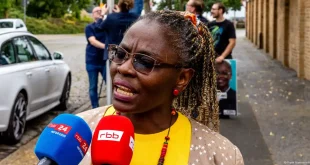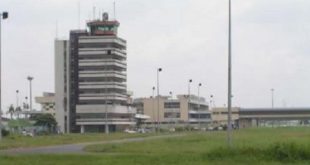RFI | Aminatou Ibrahim scoops water from the floor of her seven square metre hut at the Dana camp site for internally displaced people in Maroua, in Cameroon’s Far North Region. It’s become a familiar routine for her.
“Each time it rains our houses are flooded,” she says. Like more than 500 others living at the camp who have fled inter-ethnic violence, Aminatou lives in a dilapidated makeshift hut that houses her family of 14.
Aminatou and her family left their home in the remote Logone-Birni community in August 2021, when Musgum farmers attacked.
“It was a very scary night,” she told RFI.
“It was one Friday in 2021. The Musgums came and surrounded the village … they started setting homes ablaze. That is how we fled, leaving behind everything – our cattle, goats, sheep, property – everything.”
Climate wars
It’s a community inhabited by the Choa Arab herders and Musgum fishers and farmers: once peaceful neighbours who relied on the Logone and Chari rivers for their grazing, farming and fishing activities.
But they’ve become bitter enemies as climate change has seen the water bodies recede.
The immediate trigger was something that seemed banal: a cow owned by a Choa Arab herder had slipped into a pond dug by a Musgum fisherman and drowned.
The incident speaks to the stark reality of climate change in a region where temperatures are rising 1.5 times faster than the global average, and where 80 percent of farmland is now degraded.
As rainfall becomes unpredictable and water bodies dry up (Lake Chad has reduced by 95 percent), fishermen have resorted to building ponds to keep fish and irrigate their crops. Those ponds have become dead traps for cattle owned by Choa Arabs.
“The pools are dangerous for our animals. They slip into them when they try to drink water. They get injured or die,” Ali Ardo, a Choa Arabs grazer, told RFI.
If the Musgum fisherfolk want peace, “they must close those pools”, he adds.
But Musgum chief Blama Oumarou fires back: “These pools have been here for over 15 years. They want us to stop using them because they say they are fatal for their cattle, but we have never seen any cow perish in these pools,” he told RFI.
Mass exodus
Waves of fighting in 2021 forced at least 100,000 refugees to flee to Chad. An additional 15,000 people were forced out of their homes and have become internally displaced, living in camps across the region.
It adds to the ever-growing list of security challenges facing the Chad Basin, where insecurity is often viewed from the lens of attacks carried out by Boko Haram and Islamic State West Africa Province (ISWAP), with scant attention paid to the dangerous link between climate change and insecurity.
Yet, competition over land, water and food is fueling intercommunal violence, and leading to a new kind of refugee and IDP.
These people now say they’ve been neglected and abandoned, both by the government and by NGOs.
Aminatou concedes the UN’s Refugee Agency, the UNHCR, frequently helps out with commodities such as soap, but the last food rations they received were in May 2022.
“We face three basic challenges: lack of access to healthcare, lack of food and lack of shelter because the houses in which we live now are already dilapidated,” she told RFI.
Aminatou says a lack of mosquito nets means children frequently suffer from bouts of malaria.
“What we have here as a health centre is an empty shell with no equipment, no drugs,” she adds. “Then we are too poor to get our children to hospital when they are sick.”
Mass exodus
Waves of fighting in 2021 forced at least 100,000 refugees to flee to Chad. An additional 15,000 people were forced out of their homes and have become internally displaced, living in camps across the region.
It adds to the ever-growing list of security challenges facing the Chad Basin, where insecurity is often viewed from the lens of attacks carried out by Boko Haram and Islamic State West Africa Province (ISWAP), with scant attention paid to the dangerous link between climate change and insecurity.
Yet, competition over land, water and food is fueling intercommunal violence, and leading to a new kind of refugee and IDP.
These people now say they’ve been neglected and abandoned, both by the government and by NGOs.
Aminatou concedes the UN’s Refugee Agency, the UNHCR, frequently helps out with commodities such as soap, but the last food rations they received were in May 2022.
“We face three basic challenges: lack of access to healthcare, lack of food and lack of shelter because the houses in which we live now are already dilapidated,” she told RFI.
Aminatou says a lack of mosquito nets means children frequently suffer from bouts of malaria.
“What we have here as a health centre is an empty shell with no equipment, no drugs,” she adds. “Then we are too poor to get our children to hospital when they are sick.”
‘We can’t go back’
Ask the IDPs if they are willing to return to their villages, however, and the answer is a resounding “no”.
“I went back two weeks ago to cultivate my rice farm in Girvidiq and take care of my cattle. I was chased away,” Choa Arabs herder Ahamadou Sali told RFI.
“The Musgums told me it was not my territory, I had to leave, or be killed. I can’t go back.
“What would I go back to? I have lost my cattle and the little farmland I had is seized by the Musgums. If I went back and was not killed by the Musgums I would certainly die of hunger.”
A crisis government neglected
Musgum chief Blama Ousman told RFI that when the crisis started, the administrative authorities didn’t try to understand the seriousness of the situation.
Instead of working to provide water, which is at the root of the crisis, government officials were busy “telling us about Cameroon hosting the Africa Cup of Nations”, Ousman said.
Armel Zambo, a history professor at the University of Maroua, says resolving the conflict should mean addressing the root causes.
Tensions have been exacerbated by the effects of global warming and water scarcity, and therefore “adaptation mechanisms must be adopted”, he told RFI.
Zambo says transhumance trails created by the seasonal movement of livestock must be demarcated. He also calls for the creation of artificial water points for each community.
“The government needs to get more involved to ensure the security of people’s movements in this region, and to encourage mediation by traditional chiefs,” Zambo says.
 CameroonOnline.org Cameroon news, Actualité Camerounaise, live Web TV & Radio, World News and a lot more
CameroonOnline.org Cameroon news, Actualité Camerounaise, live Web TV & Radio, World News and a lot more




